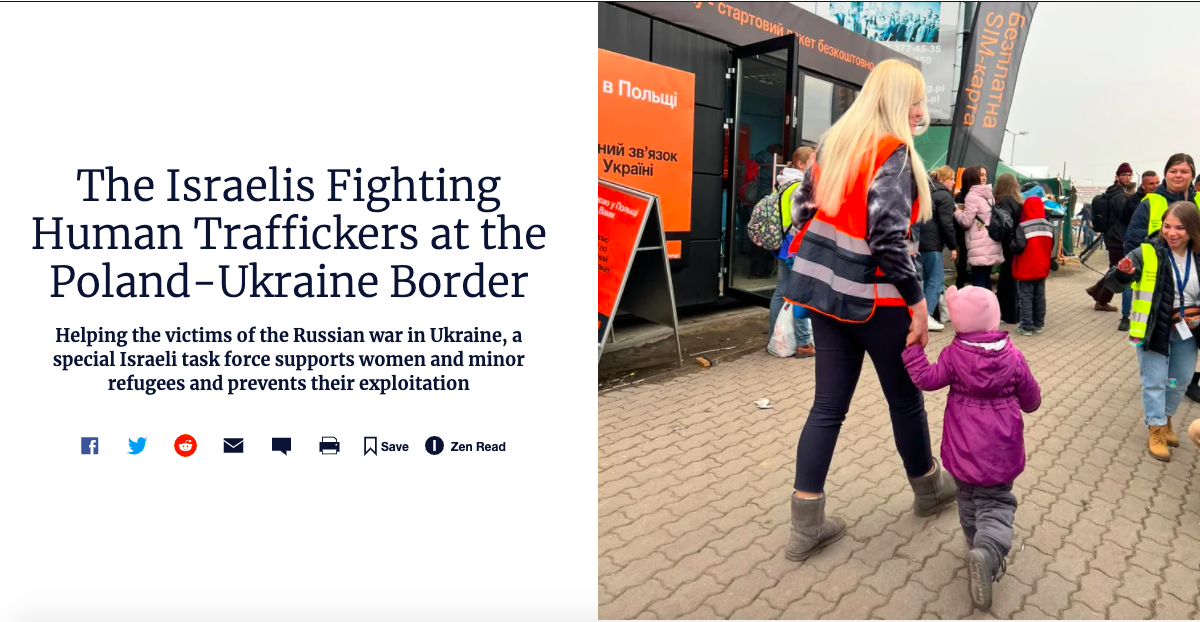Helping the victims of the Russian war in Ukraine, a special Israeli task force supports women and minor refugees and prevents their exploitation
As soon as the war in Ukraine broke out, several volunteers from the Israeli organization Topaz International were already on the ground close to the Poland-Ukraine border, joining other rescue operations helping Ukrainian women and children reach safety in neighboring countries.
But the team from the organization which promotes social projects and humanitarian assistance around the globe, found itself in good company – and bad. The rising tide of refugees fleeing from Russia’s aggression drew rescue forces and aid groups, but also human traffickers searching for vulnerable young Ukrainians.
When ads began appearing on social media seemingly offering succor to Ukrainian women, but in reality posted by gangs, Topaz International’s director of digital operations, 23-year-old Sarita Maya Mamrut, was greatly concerned.
Mamrut was gang-raped when she was 16. In recent years, as a social activist, she has been doing everything in her power to raise awareness and take action against the exploitation of women. “I saw reports on social media about the increase in trafficking in women and the exploitation of Ukrainian women refugees and I knew we had to focus on this,” she says.
For all his wealth of experience in disaster zones, says Topaz founder Mike Naftali, 71, who previously managed the Elem distressed youth organization, he only became aware of the issue of women’s suffering in war because of Mamrut. He quickly got involved.
“War exacts a tragic toll on women,” Naftali says, “they are exposed to sexual violence and/or trafficking, and may be fleeced when seeking help. He began studying these issues and how to help women fleeing from violence, together with Dr. Roni Berger, who specializes in psycho-trauma in disaster zones and goes delegations that the foundation sends abroad. There is no set practice for helping women fleeing war, let alone with children in tow, he says: “We are developing the practice on the fly.”
Thus the “With You – Wherever You Go” special task force was born, to help and support women and minor refugees in Europe and save them from getting trafficked and exploited. Topaz runs the project together with organizations like the Task Force on Human Trafficking, Fort-Da, and others.
So far, three delegations of Israeli professionals have gone to the Ukraine border, equipped with social workers, psychiatrists, psychologists, experts in treating trauma and crisis situations, doctors, nurses, teachers, social workers, and more. Most of them speak Ukrainian.
Naftali suspects their help will be needed for a long time, pointing out that aside from millions of refugees who left Ukraine, there are refugees within the country whose homes were destroyed and whose communities have disappeared. The rehabilitation process will likely take years, like after a natural disaster. They’re going to need a lot of volunteer hands on deck.
May Shapira, 34, head of the most recent delegation, is a criminologist. She usually works for Awake at Night (Halev 24/7), an Elem program for youth involved in prostitution. She has spent the last two weeks at a border crossing between Ukraine and Poland and plans to stay there for three more weeks.
The delegation includes eight people: Dr. Raya Lapidus, chief psychiatrist for the Saleet organization; Dr. Igor Bleichman, Director of the Medical Social Work Department and Head of Mental Health Services at Central District of Clalit Health Services; Dr. Peter Honiman, an occupational health physician; Tania Lavrinenko, a social worker; Valeria Tzahovsky, a social worker at Wolfson Medical Center in Holon; Orna Angel, an architect; and Yarin Kalish, an events producer and social media director.
Interviewed by phone, Shapira describes what the routine is like for the volunteers. “We are close to the border in Poland at a transit station through which masses of refugees pass – mainly women. There are mothers with children, young women and very old women. When the refugees cross the border we provide emotional support and treatment for trauma.
“We talk to them, do an initial assessment and provide initial psycho-social care. The refugees tell us, usually while crying, what is going on with them and we are able to get an understanding of their emotional state and to help them.”
By this point, awareness has developed of the danger of human trafficking, Shapira says: and the volunteers not only work with the women, they are on the lookout for the hunters. Which means, if they spot a man who seems out of place, and is offering accommodation to women, they step in, tell her where she can sleep for free, and warn her about trafficking, Shapira explains. They also inform police if anything suspicious is spotted.
And they provide concrete assistance: food, drink, dry clothes, hygiene products. Toys. “If we see a woman who’s exhausted we’ll help pick up her child, or if the little kids’ clothes are wet, we’ll give them clean, dry clothes. If she shows up with tattered bags, we’ll give her a suitcase.”
Shapira tells about a transgender refugee who made it across the border and was cared for in the context of the initiative. “We formed a special bond. She opened up and told me about sexual assaults from the age of 7 and sliding down into prostitution. During the shelling, she fled alone. She had no idea who may be still alive from her community. She was neglected, didn’t take her hormones. All she wanted was a shower and for me to bring her women’s clothes so she would feel better. Now she’s moved to Germany. I was able to organize a contribution of money for her so she can stabilize and won’t return to prostitution.”
No breaks
“Trafficking in women doesn’t take breaks,” Valeria Chakovsky, 41, translates a sign in Ukrainian placed at the border crossing. “Take a picture of the driver’s ID card and the vehicle license. Send a notice with pictures of the car to your family and friends before you get into the car. If you suspect anything, something seems strange, don’t get into the car.”
Chakovsky has been volunteering for With You – Wherever You Go at the Medyka border in Poland. Speaking by phone, she elaborates that she was born in Ukraine and moved to Israel nine years ago. She holds a master’s degree in journalism, but changed direction in Israel and became a social worker.
Ordinarily she works at the Wolfson Medical Center, where she gained experience in treating sexual trauma. After the war broke out, she immediately volunteered to help, and when hearing about the delegation, joined without hesitation.
“We wake up very early, at about 6 A.M., and we go towards the border and stay there until 7 or 8 P.M.,” she says. “We provide information that warns of trafficking in women, provide emotional support and when necessary also engage in a process of crisis intervention. When female refugees cross the border they feel lost, they think only about how to survive. We speak to them, try to process with their trip with them, what they experienced. They’re in fragile condition and it’s very easy to exploit them.
One woman told her that as she fled in her car with her young son, a Russian soldier conditioned her passage on sex. She submitted to him in order to save herself and to cross the border. An older woman who crossed the border suffers from anxiety. She sleeps with her shoes on, refusing to remove them because she’s afraid that she’ll be woken from sleep by sirens and have to run to look for shelter, Chakovsky says.
Some of the refugees tell about terrible hunger, she says. “When I brought soup and two slices of bread to an older woman, she said to me, ‘One piece of bread is enough for me, give to the others.’ I tried to reassure her that there’s enough, but she was adamant, “No, give to the others, so there will be enough for everyone, there’s a big shortage.’”
The volunteers need vast emotional resources to deal with others’ need. “I see people here with a huge heart and that’s heartwarming in all this darkness, it gives strength,” Chakovsky says. The social workers at the Israeli hospital where she works also told her to stay in touch for emotional support whenever she needs it, she adds.
Israelis are well positioned to help, Chakovsky sums up: “Unfortunately, we in Israel have an abundance of knowledge about dealing with situations of anxiety, trauma, combat and crisis. This knowledge is sorely needed here. I call on anyone who can help to join and not to remain on the sidelines.”
What kind of volunteers do they need? Psychotherapists, especially ones experienced in trauma; social workers, psychologists, psychiatrists who speak Ukrainian, Russian and Polish for missions of at least two weeks in the field, at border crossings and in temporary shelters, Chakovsky says.
They need doctors with experience in community medicine, family medicine and emergency medicine. They need activist artists and social activists who use art to bring about social changes, to join the missions to Ukraine, she adds. And they need people at the headquarters of With You – Wherever You Go in Israel, to work in fundraising, coordination of the volunteers, manage social media and the website, and so much more. It doesn’t have to take up one’s life. In Israel, ten to 15 hours a month of volunteer work makes a difference.
HAARETZ





